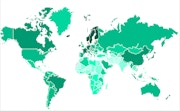
Scandinavia dominates the Sustainable Competitiveness Index 2015 while Japan higest ranking Asian country (11), followed by China (25), Signapore (34) and Korea (40) USA only ranked 41, UK 48
The Global Sustainable Competitiveness Index is based on 106 quantitative indicators collected by the World Bank and other international agencies to evaluate the ability of countries to sustain and generate new income based on all elements that enable successful development. The Sustainable Competitiveness Model index is based on 5 pillars:
- Natural Capital,
- Resource Intensity and Efficiency,
- Social Cohesion
- Intellectual Capital
- and Governance Capital
Key findings of the GSCI 2015 include:
- Iceland is leading the Sustainable Competitiveness Index for a second year - the country that refused to bail out its banks in the aftermath of the financial crisis 2007/2008.
- The Sustainable Competitiveness Index is topped by Scandinavian nations four the 4th consecutive year. The leaders are followed by other North-Western European Nations.
- The only non-European country in the top 20 are Japan (11), New Zealand (12) and Canada (16)
- The World’s largest economy, the US, is ranked 41. The UK is ranked 48. Russia is above both on 33.
- Of the booming emerging economies, Brazil is ranked 24, China 25, South Korea 39, and India 133.
- The Natural Capital sub-rankings are topped by countries with a rich biodiversity, favourable climate and sufficient water resources. Distinctions are also visible between the more industrialised countries, indicating that some countries will face lower obstacles with the coming raw material and energy scarcity
- Asian nations (Singapore, South Korea, Japan, and China) lead the Sustainable Innovation Competitiveness ranking. However, achieving sustained prosperity in these countries might be compromised by Natural Capital constraints and current high resource intensity/low resource efficiency
- The Social Cohesion ranking is headed by Northern European (Scandinavian) countries, indicating that Social Cohesion is the result of economic growth combined with some sort of social consensus
- Sovereign bond ratings do not take into account the underlying sustainability factors -they do not fully reflect investor risks.
Download the Global Sustainable Competitiveness Report 2015 (PDF, 58 pages)
Publish your content with EB Publishing
It's about who you reach. Get your news, events, jobs and thought leadership seen by those who matter to you.







